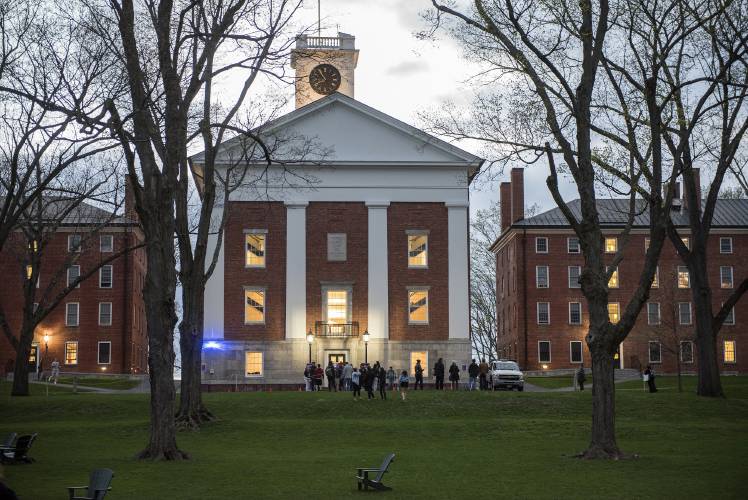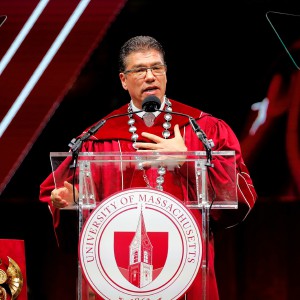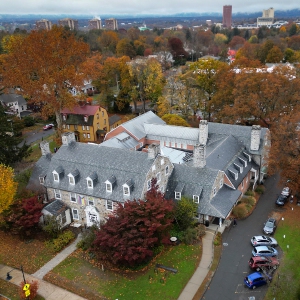Amherst Regional School Committee will seek financial lift from Amherst College
| Published: 03-14-2024 2:42 PM |
AMHERST — Both short- and long-term financial contributions and other collaborations with Amherst College will be sought through a new negotiating subcommittee being established by the Amherst Regional School Committee.
On a night when students, faculty and community members spoke against the proposed $34.81 million fiscal year 2025 budget for the high school and middle school, which is $1.69 million short of level services and could eliminate 14 educator positions, the committee voted 7-2 Tuesday to pursue the creation of a three-member subcommittee to begin meeting with Amherst College officials to strategize over funding and other topics. Amherst representative Irv Rhodes and Leverett representative Tilman Wolf voted against creating the subcommittee.
“The college wants to partner with us, and we are trying to make that happen as quickly as possible, in a way that is supportive to the region, and in a way that works for the college,” said Chairwoman Sarahbess Kenney, a Pelham representative, who noted she has been having initial conversations with the college.
The committee delayed action on the budget until Thursday at 6:30 p.m.
Earlier on Tuesday, the Amherst Pelham Education Association, the union representing teachers, paraeducators and clerical workers, and joined by supporters, marched through town and to Amherst College, where President Michael A. Elliott addressed about 40 people and expressed willingness to engage in a dialogue.
The motion to create the subcommittee made by Amherst representative Bridget Hynes. and she was joined in support by Amherst representatives Deb Leonard, Sarah Marshall and Jennifer Shiao, Shutesbury representative Anna Heard and Pelham representatives William Sherr and Kenney.
Though voting against the initiative, Wolf said he agrees with the spirit of the concept, but that it would be presumptuous that contributions come just to the regional schools. “It wouldn’t seem right that we should assume that we can negotiate with them directly and use their money, I think it would need to go through the town,” Wolf said.
Rhodes said the idea is shortsighted because the tactics and strategy are not yet known, the town of Amherst should be involved, and that having the college set up some kind of endowment might be for the best. “Just to focus it on the region is not a good way to do it,” Rhodes said.
Article continues after...
Yesterday's Most Read Articles
 Granby Bow and Gun Club says stray bullets that hit homes in Belchertown did not come from its range
Granby Bow and Gun Club says stray bullets that hit homes in Belchertown did not come from its range
 Super defers Amherst middle school principal pick to successor; one finalist says decision is retaliation for lawsuit
Super defers Amherst middle school principal pick to successor; one finalist says decision is retaliation for lawsuit
 ‘Home away from home’: North Amherst Library officially dedicated, as anonymous donor of $1.7M revealed
‘Home away from home’: North Amherst Library officially dedicated, as anonymous donor of $1.7M revealed
 Political newcomer defeats Shores Ness for Deerfield Selectboard seat
Political newcomer defeats Shores Ness for Deerfield Selectboard seat
 A DIY approach to flying: Local pilots build and help build their own aircraft
A DIY approach to flying: Local pilots build and help build their own aircraft
 Back to the screen: Amherst authors’ popular ‘Spiderwick Chronicles’ gets a new streaming adaptation
Back to the screen: Amherst authors’ popular ‘Spiderwick Chronicles’ gets a new streaming adaptation
Even though there was no decision on supporting or opposing the budget plan presented by interim Superintendent Douglas Slaughter, Shiao pressed her colleagues to vote a budget that includes $1 million more in spending, rather than passing a smaller budget and requesting a gift from the towns to restore positions. This would leave the decision on regional school funding to the Amherst Town Council, and to Town Meetings in the smaller towns.
“We don’t pass the smaller amount of and hope for a gift, we pass the bigger amount and let the towns discuss and figure out how to fund it,” Shiao said.
Wolf said Slaughter should redo the budget and add back $1 million to support student-facing positions. “I think it’s important that we do pass the bigger budget so that the towns see it’s a long-term commitment that they have to make, not just a one-time fund,” Wolf said.
But Rhodes said that is “not responsible on our part” because having a budget at risk of being rejected in two of the four towns would lead to more negative consequences. “I just don’t understand this wishful thinking,” Rhodes said.
“It’s a budget emergency,” Shiao said. “We should not operate out of fear, or failure or fear of the unknown.”
The high school library, where the meeting was taking place, was packed from the outset, with several people holding signs reading “find the funds” and “our students deserve solutions” and many members of the union wearing read.
Much of the conversation centered on the possible elimination of the restorative justice programs at the high school and middle school.
Aaron Buford, who leads the high school program, said it offers humanity and protects the emotional and physical well-being of students, and is meant to enact care and kindness. He provided 206 restorative conversations with students last school year.
“Education is more than cracking open a book, it’s really opening up yourself,” Buford said.
Amrita Rutter, a senior and member of Sunrise Amherst, said restorative justice has been an underground safety net for students, pointing to the support she received following the death of a friend. “I felt seen by them as a whole person,” Rutter said. “My pain was held and not pushed aside.”
Rutter added that the program’s demise would impact Black, brown, queer and poor students and others most at risk of expulsion or dropping out. “It was a long fight to get this program here at the high school. It would be a huge step backwards for us to lose it,” Rutter said.
Shahd Ahmed, a junior, said the program has invaluable impact. Ahmed submitted to the committee a petition signed by more than 200 people demanding protection of the program that offers a culture of empathy, problem-solving and accountability.
“Removing such a vital program would not only deprive current and future students of its benefits, but also undermine the sense of community and support our school tries to cultivate,” Ahmed said.
“Restorative justice needs to be something that’s protected,” said parent Debora Ferreira.
“If we cut that position, it would devastate the mental health of the youth,” said parent Allegra Clark.
“We do not view social and emotional health as an extra — we do not view restorative justice as an extra,” said middle school teacher Irene LaRoche.
Ferreira said she observes that “everything dealing with marginalized voices is being cut.” “We need to do better on diversity, we need to do better on inclusion,” Ferreira said.
Others also spoke, including teacher Ashley Dunn, who read a statement from the exploratory department at the middle school and performing arts department across the regional district asking the committee to oppose the budget. William Roundy, the world languages department head, spoke on behalf of 46 educators who wrote a letter to the committee.
Roundy said the world languages staff is the most diverse in the district and cutting the program will lead to students pursuing their education elsewhere.
“All of us agree the proposed changes to the middle school world language program would irrevocably harm it,” Roundy said.



 Sharing a few notes: High schoolers coaching younger string players one on one
Sharing a few notes: High schoolers coaching younger string players one on one Reyes takes helm of UMass flagship amid pro-Palestinian protests
Reyes takes helm of UMass flagship amid pro-Palestinian protests Sole over-budget bid could doom Jones Library expansion project
Sole over-budget bid could doom Jones Library expansion project Amherst poised to hire police department veteran as new chief
Amherst poised to hire police department veteran as new chief 